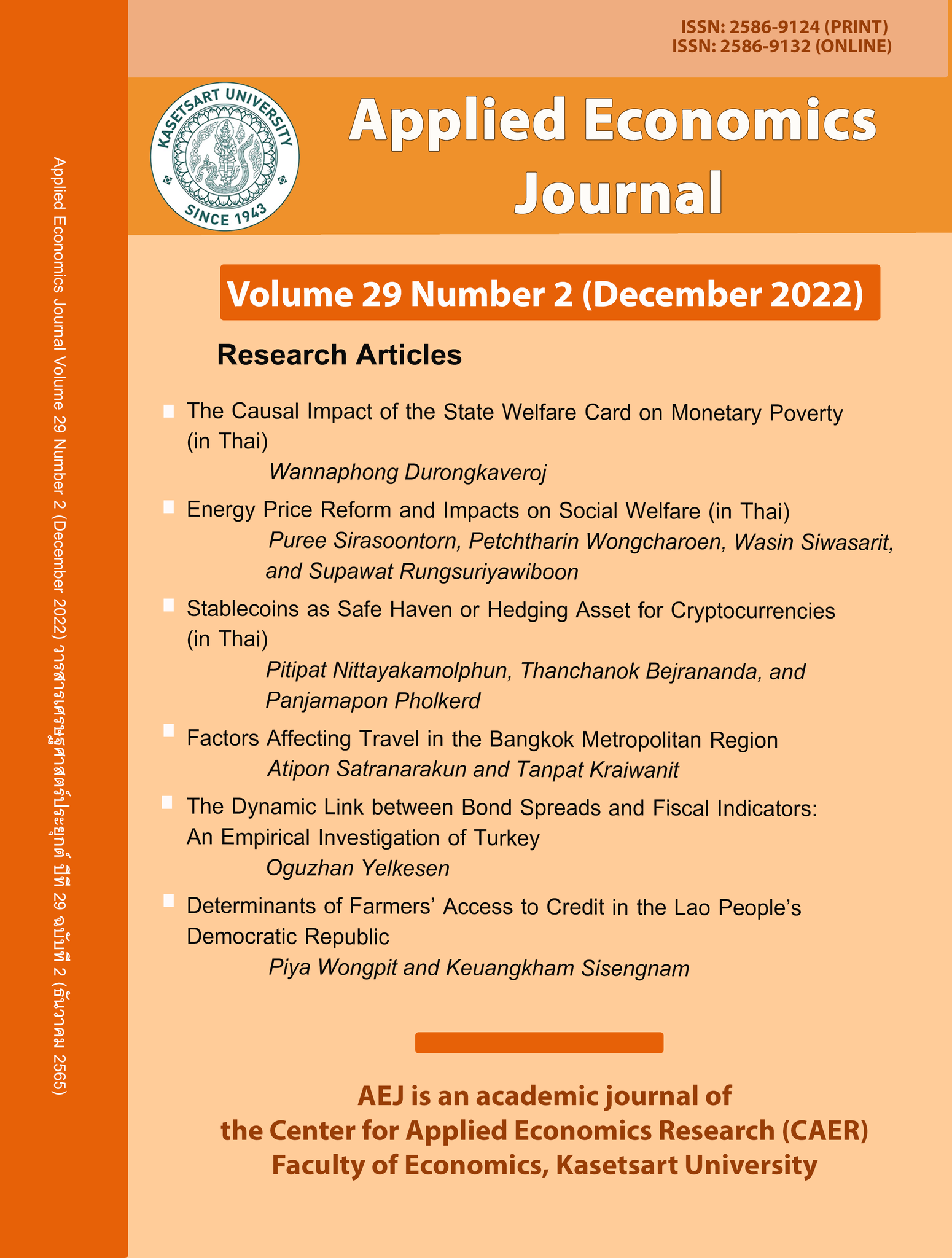The Causal Impact of the State Welfare Card on Monetary Poverty
Main Article Content
Abstract
The state welfare card, commonly known as “the card for the poor”, is a large-scale unconditional cash transfer programme implemented in Thailand since October 2017. However, Thailand saw an increase in the national poverty rate from 7.87 percent to 9.85 percent between 2017 and 2018. This is the fourth increase in poverty incidence in the country in 30 years despite mild economic growth, having no economic crisis, and large-scale cash transfer program. The recent increase in poverty incidence in Thailand calls for better understanding of this policy and the extent to which it affects poverty. In this context, regression discontinuity method is employed to investigate the causal impacts of Thailand’s state welfare programme on monetary poverty. The study finds that the programme does not increase total consumption expenditure, as intended. In addition, the programme causes a decline in food expenditure. The underlying reason for the lack of impact is possibly due to inclusion and exclusion errors. The findings underscore the need to reconsider the programme at both design and implementation stages.
Article Details

This work is licensed under a Creative Commons Attribution-NonCommercial-NoDerivatives 4.0 International License.
The paper is published under CC BY-NC-ND, in which the article is freely downloaded and shared in its original form non-commercially and its citation details are identified.
References
Adams, R. (2004). Economic growth, inequality and poverty: Estimating the growth elasticity of poverty. World Development, 32(12), 1989-2014.
Akinci, M. (2018). Inequality and economic growth: Trickle-down effect revisited. Development Policy Review, 36(S1), O1-O24.
Bastagli, F., Hagen-Zanker, J., Harman, L., Barca, V., Sturge, G., & Schmidt, T. (2019). The impact of cash transfers: A review of the evidence from low- and middle-income countries. Journal of Social Policy, 48(3), 569-594.
Bastagli, F., Hagen-Zanker, J., Harman, L., Barca, V., Sturge, G., & Schmidt, T. (2016). Cash transfers: What does the evidence say? A rigorous review of programme impact and of the role of design and implementation features. London: Overseas Development Institute. Retrieved from https://odi.org/en/publications/cash-transfers-what-does-the-evidence-say-a-rigorous-review-of-impacts-and-the-role-of-design-and-implementation-features/
Besley, T., & Burgess, R. (2003). Halving global poverty. Journal of Economic Perspectives, 17(3), 3-22.
Bhagwati, J. N. (1988). Poverty and public policy. World Development, 16(5), 539-555.
Cattaneo, M. D., Jansson, M., & Ma, X. (2018). Manipulation testing based on density discontinuity. Stata Journal, 18(1), 234-261.
Cattaneo, M. D., Idrobo, N., & Titiunik, R. (2020). A practical introduction to regression discontinuity designs: Volume I. Elements in Quantitative and Computational Methods for Social Science. Cambridge: Cambridge University Press.
Chen, S., & Ravallion, M. (2008). The developing world is poorer than we thought, but no less successful in the fight against poverty. Quarterly Journal of Economics, 125(4), 1577-1625.
Imbens, G., & Lemieux, T. (2008). Regression discontinuity designs: A guide to practice. Journal of Econometrics, 142(2), 615-635.
International Labour Organization. (2021). World social protection report 2020-22: Social protection at the crossroads – in pursuit of better future. Geneva: International Labour Organization. Retrieved from https://www.ilo.org/global/publications/books/WCMS_817572/lang--en/index.htm
Kalwij, A., & Verschoor, A. (2007). Not by growth alone: The role of distribution of income in regional diversity in poverty reduction. European Economic Review, 51(4), 805-829.
Lewis, B. D. (2020). How do mayors get elected? The causal effects of pre-electoral coalitions on mayoral election outcomes in Indonesia. Local Government Studies, 46(3), 394-413.
Skovron, C., & Titiunik, R. (2015). A practical guide to regression discontinuity designs in political science. American Journal of Political Science, 2015, 1-36.
Yang, J., Wang, S., & Dewina, R. (2020). Taking the pulse of poverty and inequality in Thailand. Washington, DC: World Bank Group. Retrieved from https://www.worldbank.org/en/country/thailand/publication/taking-the-pulse-of-poverty-and-inequality-in-thailand


